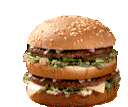



Burgernomics is based on the theory of purchasing-power parity, the notion that a dollar should buy the same amount in all countries. Source: The Economist
Thus in the long run, the exchange rate between two countries should move toward the rate that equalizes the prices of an identical basket of goods and services in each country.
The "basket" is a McDonald's Big Mac, which is produced in about 120 countries.
The Big Mac PPP is the exchange rate that would mean hamburgers cost the same in the United States as abroad.
Comparing actual exchange rates with PPPs indicates whether a currency is under- or overvalued.
You can pick another Big Mac price together with an updated exchange rate and then get the new implied PPP.
|
Country |
 |
|
|
 |
Action | ||
|---|---|---|---|---|---|---|---|
| Big Mac Prices in Local Currency |
Actual Dollar Exchange Rate |
Implied PPP of the Dollar | Under ( - )/Over (+) Valuation Against the Dollar, % | ||||
| United States |
|
| |||||
| Argentina |
|
|
|
|
|
||
| Aruba |
|
|
|
|
|
||
| Australia |
|
|
|
|
|
||
| Bahrain |
|
|
|
|
|
||
| Belarus |
|
|
|
|
|
||
| Brazil |
|
|
|
|
|
||
| Britain |
|
|
|
|
|
||
| Bulgaria |
|
|
|
|
|
||
| Canada |
|
|
|
|
|
||
| Chile |
|
|
|
|
|
||
| China |
|
|
|
|
|
||
| Colombia |
|
|
|
|
|
||
| Costa Rica |
|
|
|
|
|
||
| Croatia |
|
|
|
|
|
||
| Czech Republic |
|
|
|
|
|
||
| Denmark |
|
|
|
|
|
||
| Dominican Republic |
|
|
|
|
|
||
| Egypt |
|
|
|
|
|
||
| Estonia |
|
|
|
|
|
||
| Euro Area |
|
|
|
|
|
||
| Georgia |
|
|
|
|
|
||
| Guatemala |
|
|
|
|
|
||
| Honduras |
|
|
|
|
|
||
| Hong Kong |
|
|
|
|
|
||
| Hungary |
|
|
|
|
|
||
| Iceland |
|
|
|
|
|
||
| Indonesia |
|
|
|
|
|
||
| Jamaica |
|
|
|
|
|
||
| Japan |
|
|
|
|
|
||
| Kuwait |
|
|
|
|
|
||
| Lebanon |
|
|
|
|
|
||
| Lithuania |
|
|
|
|
|
||
| Macau |
|
|
|
|
|
||
| Macedonia |
|
|
|
|
|
||
| Malaysia |
|
|
|
|
|
||
| Mexico |
|
|
|
|
|
||
| Morocco |
|
|
|
|
|
||
| New Zealand |
|
|
|
|
|
||
| Norway |
|
|
|
|
|
||
| Oman |
|
|
|
|
|
||
| Pakistan |
|
|
|
|
|
||
| Peru |
|
|
|
|
|
||
| Philippines |
|
|
|
|
|
||
| Poland |
|
|
|
|
|
||
| Qatar |
|
|
|
|
|
||
| Russia |
|
|
|
|
|
||
| Saudi Arabia |
|
|
|
|
|
||
| Singapore |
|
|
|
|
|
||
| Slovakia |
|
|
|
|
|
||
| Slovenia |
|
|
|
|
|
||
| South Africa |
|
|
|
|
|
||
| South Korea |
|
|
|
|
|
||
| Sri Lanka |
|
|
|
|
|
||
| Suriname |
|
|
|
|
|
||
| Sweden |
|
|
|
|
|
||
| Switzerland |
|
|
|
|
|
||
| Taiwan |
|
|
|
|
|
||
| Thailand |
|
|
|
|
|
||
| Turkey |
|
|
|
|
|
||
| Ukraine |
|
|
|
|
|
||
| United Arab Emirates |
|
|
|
|
|
||
| Uruguay |
|
|
|
|
|
||
| Venezuela |
|
|
|
|
|
||
| Yugoslavia |
|
|
|
|
|
||
© copyright 2003 Sergio Da Silva, Department of Economics, Federal University of Rio Grande Do Sul, Brazil.
I have extended the original table by Professor Wong Ka Fu from the Department of Economics of The Chinese University of Hong Kong.
I thank Martha Scherer and Aline Gandon for computer assistance.